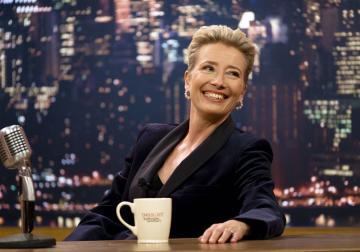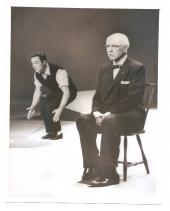Emma Thompson runs the show as an equal opportunity abuser in ‘Late Night’
The legendary Katherine Newbury, pioneer female host on late-night TV, is a tough cookie, who terrorizes her all-male writing staff — on the rare occasions she deigns to see them. Not knowing their names, she assigns them numbers instead. How toxic is this working environment? One 27-year veteran doesn’t yet feel secure enough to put up photos on his cubicle walls.
“Late Night” wastes no time. At its outset, imperious Kate (Emma Thompson) is informed she’s been getting dangerously low ratings. Maybe it’s her less-than-cutting-edge choice of guests: She just had Doris Kearns Goodwin instead of the “Avengers” stars on her show.
Now, that’s funny. Katherine herself is generally not. Though accused of being a woman who hates women, she’s really an equal opportunity abuser, especially when the honcho producer puts her on notice they want to replace her. One of the boys — No. 6 or 7 — timidly suggests she consider hiring a woman on the writing staff.
- Starring: Emma Thompson, Mindy Kaling, John Lithgow, Hugh Dancy.
- Rating: R for language throughout and some sexual references.
“So find me one!” she commands, then an afterthought: “Would a gay guy work?”
Uh, no.
Enter Molly (Mindy Kaling), clumsily fresh from a chemical plant job, with no comedy experience but guts and gusto galore. Bingo! The glass ceiling shatters. She’s hired to bring that fresh gender and ethnic perspective, determined to make Kate and her show relevant again.
But it might be too late. Katherine is resistant — and prickly. Her favorite two-word imperative is the same as “The Apprentice’s” ex-host and, long before that, of cigar-chomping George Burns to hapless Harry Von Zell, his bumbling announcer on the old Burns & Allen TV show:
“You’re fired, Harry.”
“Oh, but George, listen...”
“Put your things in a box.”
“Now, George, please, I just...”
“Out, Harry.”
It was the funnier for being uttered so often and so matter-of-factly.
The humor in “Late Night” is not at that pantheon level and, to be fair, this is a dramedy rather than a comedy. Its script by co-star Kaling is serviceable, if predictable, with her autobiographical roots proudly showing: Born Vera Mindy Chokalingam to Indian parents in Cambridge, Mass., she became, at 24, the first female writer on “The Office” hit TV series, as well as a cast member.
In this cast, as bubbly Molly, she’s driven to prove she’s not just a “diversity hire” disrupting the brotherhood, by spiffing up Kate’s monologues with such hitherto taboo topics as sex, abortion, cancer, depression, plus interactive Letterman-type gags. Can she revitalize Kate’s humanity as well as her career?
“Your earnestness can be very difficult to be around,” someone tells her. Audience members might feel the same.
On the other hand, it’s always fun to be around Emma Thompson, even when she’s the Wicked Cold Witch of the West — a power performance here to rival Meryl Streep’s in “The Devil Wears Prada.” Her Katherine has short-cropped hair and a modified Ellen DeGeneres look, minus the pixie personality and dance skills. She’s arch and pretentious (Steve Martin gave her a Hopper painting), selfish and casually cruel. The show is her life’s blood. She’d kill for it and be dead without it.
Thompson’s remarkable range never ceases to amaze, moving effortlessly between high art and Hollywood. She’s the only person to win Oscars both for acting (in Merchant-Ivory’s “Howards End,” 1992) and writing (the screenplay for Ang Lee’s “Sense and Sensibility,” 1995) and one of very few nominated for both leading and supporting roles in the same year (“Remains of the Day” and “In the Name of the Father,” 1993).
John Lithgow as Katherine’s long-suffering, self-pitying pianist-hubby has one good line that hits wryly close to home: “Emeritus is what they call you when they don’t want you anymore but you’re not dead yet.” There’s some periodic soap operatic stuff involving him, and a hokey, soapy twist involving Hugh Dancy as the one male writer anybody wants to have an affair with.
Canadian-Indian director Nisha Ganatra is a graduate of NYU film school, where she studied with Martin Scorcese and Spike Lee, neither of whose influence is remotely discernible in this mildly diverting mainstream fare about women and minorities angling for equal footing in the workplace.
Post-Gazette film critic emeritus Barry Paris: parispg48@aol.com.







